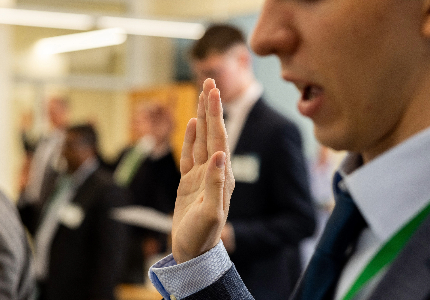Excellence in Lawyering and Leadership Program
All students should advance in personal and professional growth while pursuing their legal education at Wilmington University School of Law. In addition to in-class learning, the development of interpersonal skills and greater emotional intelligence allows lawyers to communicate respectfully with, advocate for, and lead their communities. Through thoughtful, comprehensive extra-curricular programming, the law school encourages and expects students to engage in opportunities provided for personal development, professional development, and continuing education outside of the classroom. In recognition of standards required for law schools and key characteristics of successful lawyers, all students must participate in defining their professional identity, developing cultural competency, strengthening lawyering skills and embracing wellness and balance in their day-to-day lives. The workshops, activities, and events offered through the program address these topics while acknowledging that they are not entirely distinct and do not exist separately in life and work activities. WilmU Law’s Excellence in Lawyering and Leadership Program underscores issues of importance in our society and the professionalism expected of one embarking on the highly regarded and entrusted position of attorney. Download PDF of program.
Areas of Focus
Defining Professional Identity (DPI)
Professional relationships and networking begin in law school and continue to grow through an individual’s legal career. Students will have opportunities to explore various pathways in the legal profession, participate in pro bono and law related-public service activities, and reflect on those experiences. Additionally, students will engage in conversation about what it means to be a lawyer, the inherent leadership expectation that comes with this important role, and the special obligations lawyers have to their clients and society.
Strengthening Lawyering and Leadership Skills (SLLS)
Participation in workshops allows for continuing development and exploration of legal skills, writing, study methods, and leadership skills. These workshops include deep dives into specific skills utilized in the practice of law, instilling a commitment to learning that many state bar associations require under continuing education.
Developing Cultural Competency (DCC)
Panel presentations, lectures and interactive workshops allow students to converse with each other and the legal community as they grow their cross-cultural understanding, break down barriers in the legal profession, and engage in challenging conversations with civility and respect for opposing ideas.
Embracing Wellness and Balance (EWB)
Through engagement in a variety of physical activities, meditation exercises, and wellness workshops, students are encouraged to recognize the necessity of well-being in the life of a law student. Students also have access to well-being resources, including, but not limited to, mental health counseling, substance abuse disorders, and stress management.

